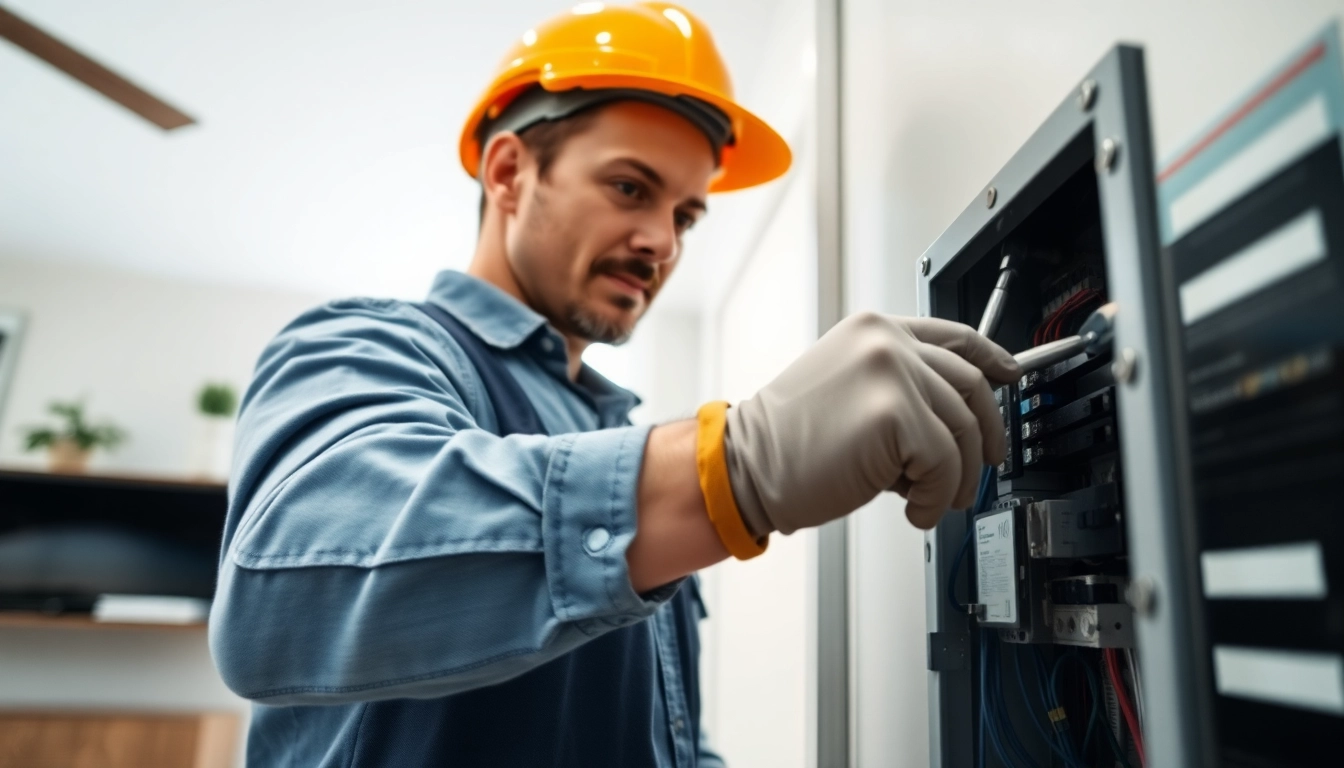Understanding Electrical Panels in Clearwater
In Clearwater, understanding your electrical panel is crucial for maintaining a safe and efficient electrical system in your home. An electrical panel, often referred to as a breaker box, serves as the hub of your home’s electrical distribution system. It receives power from the utility company and distributes it to different circuits throughout your home, managing the electrical loads and ensuring that you have the power you need when you need it. For residents considering upgrades or repairs on their electrical panels, it’s essential to recognize the significance of this central unit. To dive deeper into the specifics of Electrical Panel Clearwater, let’s break down its functions and types.
What is an Electrical Panel?
An electrical panel is a metal box that contains circuit breakers or fuses that control the power supply to different areas of your home. It acts as a safety mechanism, preventing overloaded circuits and potential electrical fires. The panel is also equipped with a main breaker that can shut off power to the entire house in case of an emergency. Modern electrical panels come with various features that enhance safety, such as Ground Fault Circuit Interrupters (GFCIs) and Arc Fault Circuit Interrupters (AFCIs), which provide additional safeguards against electrical issues.
Key Functions of Your Electrical Panel
The primary functions of your electrical panel include:
- Power Distribution: Distributing electricity from the utility company to all circuits in the home.
- Overload Protection: Automatically shutting off circuits when they exceed safe limits to prevent overheating and fires.
- Grounding: Providing a pathway for electrical current to safely return to the ground in the event of a fault.
- Control Management: Allowing homeowners to manually control electricity usage by turning circuits on or off as needed.
Types of Electrical Panels Commonly Used
There are several types of electrical panels commonly used in Clearwater, including:
- Type A Panel: The most common type, typically used in residential homes.
- Type B Panel: Often used in commercial buildings, handling higher amperage requirements.
- Main Breaker Panel: Includes a main breaker that controls power to all circuits, providing overall home safety.
- Sub Panels: These panels are installed to handle additional electrical loads, often found in larger homes or properties with multiple buildings.
Signs You Need an Upgrade
Recognizing when to upgrade your electrical panel is crucial for maintaining safety and efficiency. Here are some signs that indicate it may be time for an update.
Frequent Breaker Trips and Overloads
If you frequently experience circuit breakers tripping, this is a clear sign that your panel may not be equipped to handle your current power demands. Regular trips can indicate that your electrical panel is overloaded, which can lead to overheating and potential hazards. This is especially common in homes that have added electrical appliances or features over time, as older panels may not be designed to accommodate modern energy needs.
Old or Outdated Equipment Issues
Older electrical panels, especially those made before the 1980s, may not only lack the capacity to power today’s electronics but may also have outdated technologies that pose safety risks. If your electrical panel uses fuses instead of circuit breakers, or if you notice rust or burns inside the panel, it’s time to consult a professional electrician.
Home Renovations or Additions
Home renovations, such as additional rooms, finished basements, or new appliances, often require more electrical load than your existing panel can handle. An upgrade may be necessary to ensure that you have adequate power to support the increased demand.
Benefits of Upgrading Your Electrical Panel
Upgrading your electrical panel can have numerous benefits that enhance the safety, efficiency, and functionality of your home’s electrical system. Here are some significant advantages:
Enhanced Safety Features
Modern electrical panels are designed with improved safety features that can significantly reduce the risk of electrical fires. Current panels include GFCIs and AFCIs, which provide protection against ground and arc faults. This means better protection for you and your family against electrical shocks and fires, making upgrades worthwhile for peace of mind.
Increased Electrical Capacity
With the rise of home technology, increased energy demands are common in modern homes. Upgrading your electrical panel can increase your home’s capacity, allowing you to safely accommodate new appliances, systems, and smart home devices without the fear of overload.
Improved Energy Efficiency
An upgraded electrical panel can help improve overall energy efficiency by ensuring that the electrical flow is optimized and that newer technology is utilized. This can translate into lower energy bills and a more reliable power supply for your home.
Choosing the Right Electrician in Clearwater
Hiring the right electrician for your electrical panel service is as crucial as the upgrade itself. Here are some tips to help you choose wisely.
Qualifications to Look For
When selecting an electrician, ensure they are licensed and insured. Consider their experience with electrical panel upgrades, and check their reputation in the community. Reviews and testimonials can provide insights into their work ethic and customer service quality.
Questions to Ask Before Hiring
Prepare a list of questions to ask potential electricians. These might include:
- What is your experience with electrical panel upgrades?
- Can you provide references from past clients?
- What is your warranty on workmanship?
- How do you handle unexpected costs?
Understanding Quotes and Pricing
When obtaining quotes, ensure that each electrician is considering the same factors—such as panel type, size, and any necessary permits. A clear understanding of the costs involved, from labor to material, helps prevent surprises down the line.
Maintenance Tips for Your Electrical Panel
Keeping your electrical panel in good shape is crucial for its longevity and functionality. Here’s how to maintain your panel effectively.
Regular Inspection Guidelines
Conduct routine inspections of your panel at least once a year. Look for signs of wear and tear, rust, or burnt wires. If you notice anything concerning, consult an electrician immediately to avoid potential hazards.
Identifying Warning Signs Early
Aside from regular checks, being aware of warning signs can help catch problems early. Flickering lights, burning smells, or unusual sounds from the panel can all indicate underlying issues.
When to Call a Professional Service
Whenever in doubt, it’s best to consult a professional electrician. If you’re experiencing persistent issues with your panel or need an upgrade, don’t hesitate to reach out for expert advice. Professional services ensure that you adhere to local codes and that your home remains safe and functional.



